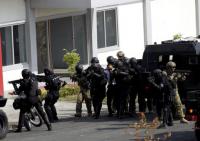-
European security services worry about a wave of female terrorists
The security services in France have grown increasingly worried about a new wave of female terrorist recruits. The concern has grown over the last few weeks, as arrests were made of French women, some of them teen-agers, who had pledged allegiance to ISIS. Earlier this month French police arrested two young women, 17 and 19, who were being groomed to carry out an attack on “specific targets” in France in retaliation for the recent death of the ISIS leader Abu Muhammad al-Adnani. Since the beginning of September, the French security services have arrested six women for plotting terrorists attacks.
-
-
Swiss approve broader surveillance powers for the government
A majority of 65.5 percent of Swiss voters have on Sunday approved a new surveillance law, agreeing with the government’s argument that that the country’s security services needed more powers in an increasingly dangerous world. Relative to other European countries, the Swiss police and intelligence agencies have had limited investigative powers. For example, the law which was updated on Sunday had banned phone tapping and e-mail surveillance under any circumstances.
-
-
Number of terrorists in U.K. jails peaks
The number of terrorist held prisoner in British jails 152 — fifty higher than five years ago, according to the latest set of quarterly reports from the Home Office. The reported record number of terrorist prisoners come one month after the Acheson review, which said that past complacency had allowed Islamic extremism to flourish in British jails, and two weeks after the government has launched a new initiative to build specialized high-security units in jails to separate the most subversive inmates from the general jail population.
-
-
Che Guevara era ends: FARC ratifies Colombia peace accord, ending 52-year war

Colombia’s FARC rebel group on Thursday voted unanimously to approve a peace deal with the government, officially declaring an end to the 52-year war. The insurgent group now prepares to transform itself into a new political party. The title of one article offering an analysis of the momentous even captured it all: “Che Guevara era closes as Latin America’s oldest guerrilla army calls it a day.” “This is an agreement with the last of the great guerrilla movements that emerged in the context of the cold war,” says one expert. “There might be other episodes, but strategically the armed project, the armed utopia, is closing its cycle with FARC.”
-
-
Will Colombia’s peace deal get the people’s vote?
On 26 September 2016, the Colombian government and the Fuerzas Armadas Revolucionarias de Colombia (FARC) will sign a formal agreement to end fifty years of conflict. The agreement is precedent-setting in several ways. It will be the first negotiated end to a civil conflict in the world under the new international standards of the 2002 Rome Statutes to hold accountable armed combatants who commit grave human rights abuses. It will also be the first peace process to have included victims at the negotiating table. In another innovation, it extends the special justice system to other sectors of the society beyond the FARC, such as civilian sponsors and financiers of paramilitary forces, as well as the government’s security forces. Finally, it will be the first end to a civil war that does not rely primarily on amnesty for all sides, but instead provides new forms of restorative justice. This is a compromise effort to reach peace while also holding perpetrators of human rights abuses accountable, and I believe could serve as a model for the world.
-
-
Adviser to EU top court recommends removing Hamas, Tamil Tigers from EU terror watch list
The advocate-general of the European Court of Justice on Thursday advised the court that Hamas and the Tamil Tigers should be removed from the EU’s terror list. He emphasized that the recommendation is the result of his conclusion that the EU governments followed an improper procedures when they decided to add the two groups to the organization’s terror watch list.
-
-
Assessing the risk from Africa as Libya loses its chemical weapons
Libya’s remaining chemical weapons left over from the Gaddafi regime are now being safely disposed of in a German facility. This eliminates the risk of them falling into the wrong hands. But can these same hands acquire weapons of mass destruction from the rest of Africa? The disposal of Libya’s chemical weapons has lowered the risk of weapons of mass destruction in Africa. But we have seen how far non-state actors are willing to go to either produce or steal such weapons. For example, analysts envision militants known as “suicide infectors” visiting an area with an infectious disease outbreak like Ebola purposely to infect themselves and then using air travel to carry out the attack. Reports from 2009 show forty al-Qaeda linked militants being killed by the plague at a training camp in Algeria. There were claims that they were developing the disease as a weapon. The threat WMD pose cannot be ignored. African countries, with help from bilateral partners and the international community, have broadened their nonproliferation focus. They will need to keep doing so if the goal is effectively to counter this threat.
-
-
Cleaning concrete contaminated with chemicals
In March 1995, members of a Japanese cult released the deadly nerve agent sarin into the Tokyo subway system, killing a dozen people and injuring a thousand more. This leads to the question: What if a U.S. transportation hub was contaminated with a chemical agent? The hub might be shut down for weeks, which could have a substantial economic impact. Craig Tenney, a chemical engineer at Sandia National Laboratories, is looking for better ways to clean contaminated concrete to reduce that impact.
-
-
ISIS fired chemical shells at U.S., Iraqi troops near Mosul
U.S. defense officials say that on Tuesday ISIS has fired a shell containing mustard agent at the Qayarrah air base south of Msoul. U.S. and Iraqi troops use the base for operations against the Islamist group. No U.S. or Iraqi troops were hurt, and none has shown symptoms of exposure. One official told CNN that the agent had “low purity” and was “poorly weaponized.” A second official described it as “ineffective.”
-
-
Psychology expert: Why extremists use violence in their quest for significance

The recent attack in New York, which left 29 persons wounded, the bombings in New Jersey and the knife attack in Minnesota serve as a grim reminder that this year of blood and fury carries on. Though incomprehensible to most, these instances of seemingly rampant violence have a compelling rhyme and reason to the perpetrators. They carry out their carnage in full premeditation and after careful preparation. Theirs isn’t crime of passion, or case of temporary insanity. It is, instead, a deliberately chosen path grounded in a confidently held worldview. Based on my research, violent extremism typically requires the presence of three elements that jointly create the terrorist mindset: what I call the “N-triad of radicalization.” The three N’s are need, narrative, and network. Though it might appear random and haphazard, the violence on streets of the world’s cities is psychologically coherent. The combination of individuals’ needs, narratives, and networks forms a combustible mixture ready to explode in mayhem and murder. Taking all three elements into account may offer a reasonable, science-based approach to preventing and reversing radicalization. It may be key to interventions and programs that can stem the tide of violent extremism that seriously threatens the world’s security and stability.
-
-
Ahmad Khan Rahami’s wife held in UAE for questioning about bomb plot
The wife of t Ahmad Khan Rahami, the man behind the bombings in New Jersey and New York, left the United States just days before the attack. The woman, whose name has not been revealed, was intercepted by United Arab Emirates authorities on Monday, where investigators are trying to determine whether she was aware of the bombing plot.
-
-
Hamas threatens Americans after State Dept. labels another leader “terrorist”
A Hamas militant issued a thinly veiled threat against Americans after the State Department officially designated a Hamas leader as being an international terrorist. The State Department’s designated Fathi Hammad as an international terrorist on Friday, saying that he used his position as a former interior minister “to coordinate terrorist cells.”
-
-
What is terrorism, and is it getting worse?
Because terrorism is so sensationalized by the media and oversimplified by authorities, it is important to demystify common misconceptions. Only then can we understand why individuals carry out political violence and put today’s acts of terrorism in historical context. Terrorism is not new. Rather it has a long history – and a historical review of terrorism activity in Western countries shows that terrorism is not worse than before the 9/11 era. The opposite is true. Western Europe, for example, has been experiencing relatively low terrorist activity during the period 2000 to 2016 compared to the period 1970 to 1995. Moreover, terrorism as a tactic does not work well. A researcher who studied 457 terrorist groups worldwide since 1968 found that terrorist groups lasted an average of eight years. No terrorist organizations studied were able to conquer a state, and 94 percent were unable to achieve even one of their strategic goals.
-
-
NYC terrorist captured: What we know so far
Ahmad Khan Rahami, the suspect in placing two bombs in Manhattan on Saturday – one of them exploded, injuring twenty-nine people, while the other was disarmed — has been arrested in Linden, New Jersey. He was spotted by residents sleeping in a vestibule next to a bar, and they called the police. Fire was exchanged as the police closed in on him, and two policemen, and Rahami himself, were injured, but not seriously. The Rahami family’s chicken restaurant had problems city ordinances in Elizabeth, New Jersey, and in 2011 the family sued that city and its police department for discrimination and harassment.
-
-
FBI identifies Manhattan bombs suspect as Ahmad Khan Rahami of New Jersey
The FBI has identified the suspect behind Saturday Manhattan blast – and the explosive device which was found before it exploded in another Manhattan location – as Ahmad Khan Rahami, 28 — a naturalized American living in New Jersey. He is originally from Afghanistan.
-
- All
- Regional
- Water
- Biometrics
- Borders/Immig
- Business
- Cybersecurity
- Detection
- Disasters
- Government
- Infrastructure
- International
- Public health
- Public Safety
- Communication interoperabillity
- Emergency services
- Emergency medical services
- Fire
- First response
- IEDs
- Law Enforcement
- Law Enforcement Technology
- Military technology
- Nonlethal weapons
- Nuclear weapons
- Personal protection equipment
- Police
- Notification /alert systems
- Situational awareness
- Weapons systems
- Sci-Tech
- Sector Reports
- Surveillance
- Transportation
Advertising & Marketing: advertise@newswirepubs.com
Editorial: editor@newswirepubs.com
General: info@newswirepubs.com
2010-2011 © News Wire Publications, LLC News Wire Publications, LLC
220 Old Country Road | Suite 200 | Mineola | New York | 11501
Permissions and Policies
Editorial: editor@newswirepubs.com
General: info@newswirepubs.com
2010-2011 © News Wire Publications, LLC News Wire Publications, LLC
220 Old Country Road | Suite 200 | Mineola | New York | 11501
Permissions and Policies
